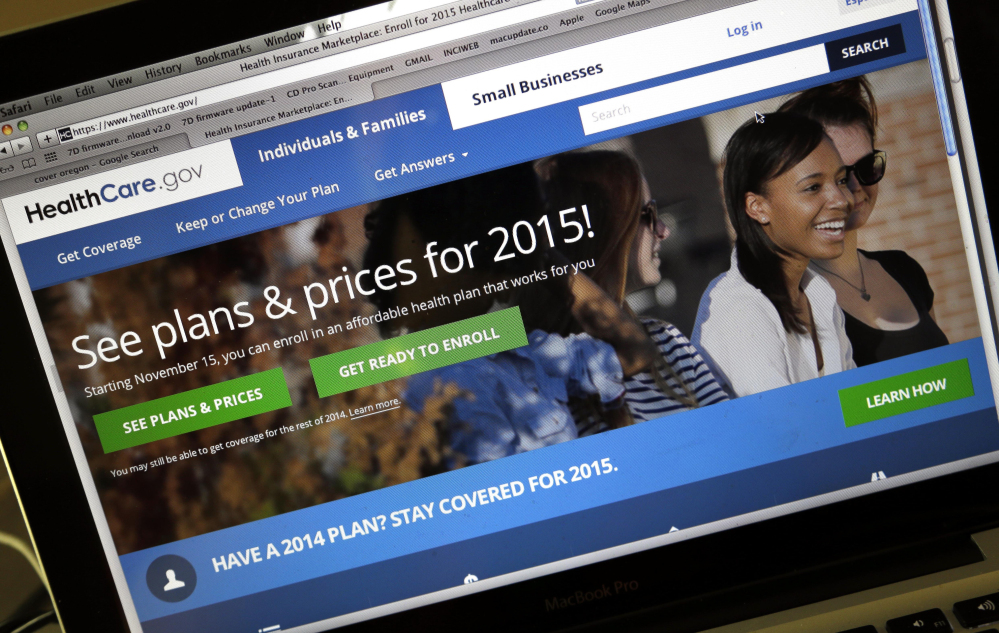WASHINGTON – A nonpartisan government study says repealing President Barack Obama’s signature health care law would modestly increase the budget deficit and the number of uninsured Americans would rise by more than 20 million.
The report from the Congressional Budget Office comes ahead of a highly anticipated Supreme Court ruling that could have a major impact on the Affordable Care Act, nullifying health insurance subsidies for some 6 million people in more than 30 states. The budget analysts said that would add a host of new uncertainties to their estimates.
Republicans now in control of both chambers of Congress say they are not backing away from their promise to repeal “Obamacare.”
But repealing the law’s spending cuts and tax increases would add $137 billion to the federal deficit over the coming decade, CBO said in the report issued Friday, even though almost $1.7 trillion in coverage costs would disappear. Repeal would reduce deficits in the first few years but increase them steadily as time goes on.
Repeal would up the number of uninsured people by about 24 million people, and the share of U.S. adults with health insurance would drop from roughly 90 percent now to about 82 percent, the report said.
On the other side of the balance sheet, the report says that completely repealing the law would, on average, boost the economy by 0.7 percent a year after the start of the ’20s. That’s mostly because more people would enter the workforce or work more hours to make up for the lack of government health care subsidies.
But the positive economic effects of repeal would fade over time, the budget agency said, offset by the increased budget deficits. Repeal of the excise tax on high-cost plans is a major reason why deficits would increase in later years, because more and more plans would be hit by this “Cadillac tax.”
The CBO provides lawmakers with nonpartisan budget and economic analysis. Republicans controlling Congress have increasingly asked the office to incorporate a broader range of potential economic consequences of major legislation into its work, and Friday’s report is the first major study released since GOP appointee Keith Hall took over as CBO director. CBO analysts always caution that their studies of legislation can be uncertain, especially over many years.
Previously, CBO analyses would not have taken into account such a broad range of economic consequences. The agency said that using its earlier approach would have resulted in a bigger estimated impact on the deficit, an increase of $353 billion over the coming decade. Adding the economic factors cuts the repeal’s effect on the deficit by more than half over 10 years, the report says.
The budget scorekeepers also offered a cautionary note to Congress: Obama’s law is by now so enmeshed with the health care system that uprooting it would create its own issues.
“Implementing a repeal of the ACA would present major challenges,” the report said. “In the five years since its enactment, nearly every key provision of the law has taken effect and has been incorporated into final rules and other administrative actions. Undoing the ACA would thus be quite complicated.”
Unwinding changes to Medicare would be particularly difficult, the CBO said.
The health care law offers subsidized private health insurance policies to people who don’t have access to coverage on the job, along with an expanded version of Medicaid geared to low-income adults, in states that have accepted the expansion.
If the law is repealed, about 18 million fewer people would have individual health insurance policies, and about 14 million fewer people would be covered under Medicaid, the report said. Gains in employer coverage would partially offset those losses, with 8 million more covered through job based insurance.
About 30 million people are still uninsured, even after two full years of coverage expansion under the law.
The study comes as Washington awaits the Supreme Court’s decision on subsidies.
In a twist, the budget office suggested that if those subsidies are curtailed, it would reduce the projected savings from repealing the rest of the law. That’s because the government would not be spending money to subsidize coverage in the affected states.
Conservatives who brought the lawsuit say the law’s literal wording prevents the federal government from subsidizing private health insurance premiums in states that failed to set up their own insurance markets. Most have not done so, reflecting continued political opposition to the program. The administration argues that the law intended subsidies to be available in all states.
The Supreme Court is expected to issue the decision by the end of June.
Republicans in control of the House and Senate have said that if the court strikes down subsidies in the mostly GOP-held states that would be affected, they would try to advance legislation to ease the immediate effect on people who would lose coverage.
Send questions/comments to the editors.



Success. Please wait for the page to reload. If the page does not reload within 5 seconds, please refresh the page.
Enter your email and password to access comments.
Hi, to comment on stories you must . This profile is in addition to your subscription and website login.
Already have a commenting profile? .
Invalid username/password.
Please check your email to confirm and complete your registration.
Only subscribers are eligible to post comments. Please subscribe or login first for digital access. Here’s why.
Use the form below to reset your password. When you've submitted your account email, we will send an email with a reset code.